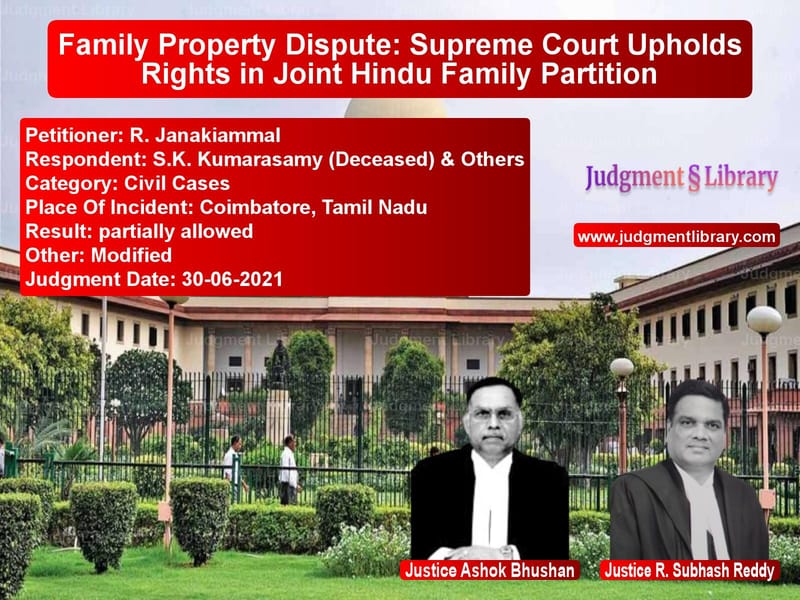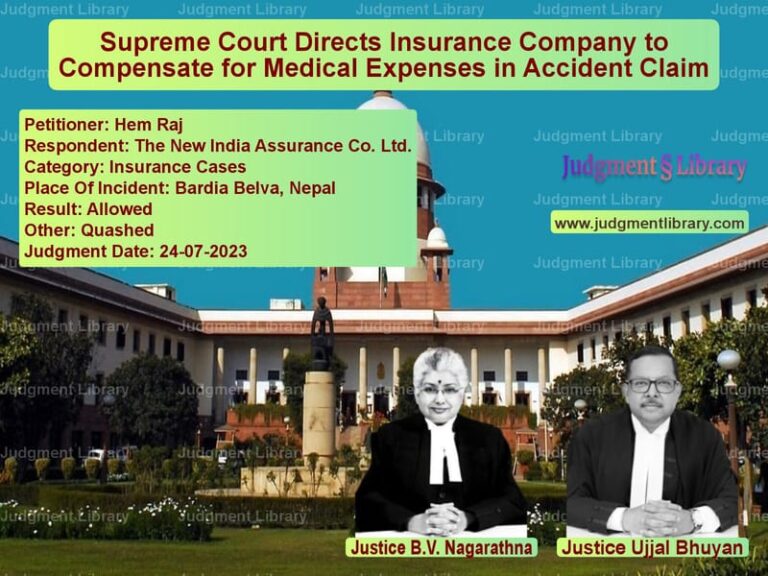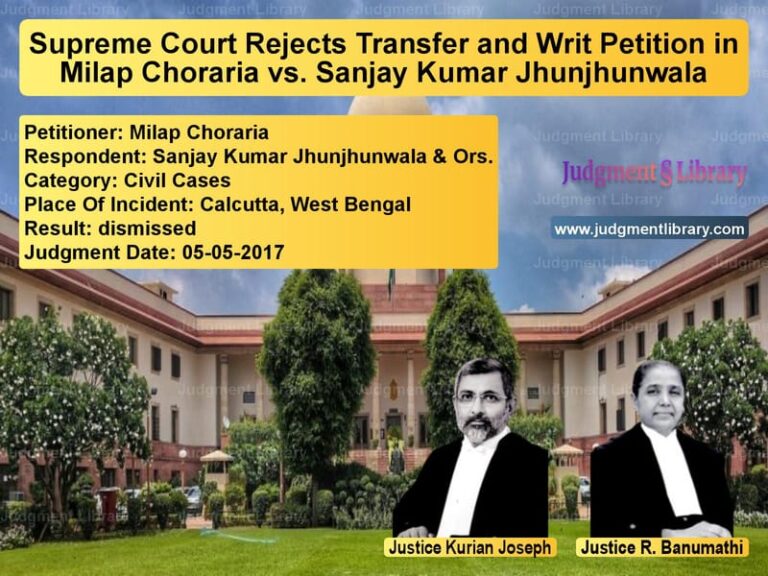Family Property Dispute: Supreme Court Upholds Rights in Joint Hindu Family Partition
The legal battle in R. Janakiammal v. S.K. Kumarasamy (Deceased) & Others centered around a long-standing family property dispute involving the partition of assets among three branches of a Hindu joint family. The Supreme Court’s verdict, delivered on June 30, 2021, clarified the rights of family members over immovable property and emphasized that a partition decree must adhere to legal provisions to be valid.
Background of the Case
The case involved three branches of a family that had historically lived together, running joint businesses and acquiring properties. Over time, disputes arose regarding the rightful ownership and partition of assets, particularly concerning a residential property in Tatabad, Coimbatore.
The plaintiffs, R. Janakiammal and S.R. Somasundaram, challenged a 1984 compromise decree that allegedly deprived them of their fair share in family properties. They contended that the decree was fraudulent, executed without their full knowledge, and led to an unfair distribution of assets.
Arguments by the Appellants
The appellants, represented by Shri V. Giri and Shri Gaurav Agrawal, argued that:
- The 1984 compromise decree was unfair and inequitable, executed under misrepresentation.
- The family continued to remain joint after an earlier 1960 partition deed, which was executed mainly to evade land ceiling laws.
- The property in Tatabad, Coimbatore, was acquired using family funds but was wrongfully registered in the name of S.K. Kumarasamy.
- Janakiammal, a widow, was not aware of the contents of the compromise agreement, and her signature was allegedly obtained under false pretenses.
- The alleged oral agreement of 1981 for property division was fabricated and never formally documented.
Arguments by the Respondents
The respondents, led by Shri Kapil Sibal and Shri S. Nagamuthu, contended that:
- The 1960 partition deed had legally separated the family branches, and all subsequent transactions were made by independent family units.
- The 1984 compromise decree was valid, signed by all family members, and was legally binding.
- The Tatabad property was lawfully purchased by S.K. Kumarasamy using funds from Swamy & Swamy Plantations, not joint family funds.
- The plaintiffs had ample time to challenge the decree earlier, but their delay undermined their claims.
Key Observations by the Supreme Court
The Supreme Court, comprising Ashok Bhushan and R. Subhash Reddy, analyzed the evidence and past legal precedents to determine whether the family continued as a joint entity after 1960.
1. Status of the Family After 1960
- The 1960 partition deed was executed primarily to avoid land ceiling restrictions, but the family continued living together and acquiring property jointly.
- The family remained functionally joint, as evident from shared businesses, co-owned estates, and lack of independent financial dealings among members.
2. Legality of the 1984 Compromise Decree
- The decree was challenged as fraudulent and lacking informed consent.
- The court noted that Order XXIII Rule 3A of the Civil Procedure Code barred separate suits challenging compromise decrees. However, it recognized the plaintiff’s right to challenge fraud within the original suit.
3. Rights Over Tatabad Property
- The Tatabad property was acquired using funds from Swamy & Swamy Plantations, which was jointly owned by all family branches.
- The court found that the property was a joint family asset and should have been included in the partition.
- Since it was excluded from the 1984 compromise decree, the plaintiffs retained their right to claim their share.
Final Judgment
The Supreme Court ruled that:
- The 1984 compromise decree was legally binding but could not be enforced to exclude properties omitted from its scope.
- The residential property in Tatabad was part of the joint family estate.
- The plaintiffs (R. Janakiammal and S.R. Somasundaram) were entitled to a one-third share in the Tatabad property.
- A preliminary partition decree was issued, allowing the plaintiffs to claim their rightful share through a final decree proceeding.
Impact of the Judgment
The ruling is significant because:
- It reinforces the principle that compromise decrees must be executed with informed consent and fairness.
- It establishes that family members cannot be deprived of their rightful share in joint family properties.
- It clarifies that a partition deed does not automatically end a joint family if subsequent conduct indicates continued joint ownership.
Conclusion
This case underscores the complexities of joint Hindu family partitions and the importance of fair asset distribution. The Supreme Court’s ruling ensures that procedural barriers do not prevent rightful claims, particularly when fraud or misrepresentation is alleged. By upholding the one-third share of the plaintiffs in the Tatabad property, the court reaffirmed the need for equitable and just property settlements in family disputes.
Petitioner Name: R. Janakiammal.Respondent Name: S.K. Kumarasamy (Deceased) & Others.Judgment By: Justice Ashok Bhushan, Justice R. Subhash Reddy.Place Of Incident: Coimbatore, Tamil Nadu.Judgment Date: 30-06-2021.
Don’t miss out on the full details! Download the complete judgment in PDF format below and gain valuable insights instantly!
Download Judgment: r.-janakiammal-vs-s.k.-kumarasamy-(dec-supreme-court-of-india-judgment-dated-30-06-2021.pdf
Directly Download Judgment: Directly download this Judgment
See all petitions in Property Disputes
See all petitions in Succession and Wills
See all petitions in Judgment by Ashok Bhushan
See all petitions in Judgment by R. Subhash Reddy
See all petitions in partially allowed
See all petitions in Modified
See all petitions in supreme court of India judgments June 2021
See all petitions in 2021 judgments
See all posts in Civil Cases Category
See all allowed petitions in Civil Cases Category
See all Dismissed petitions in Civil Cases Category
See all partially allowed petitions in Civil Cases Category







